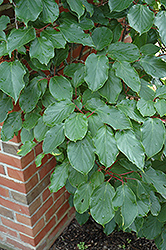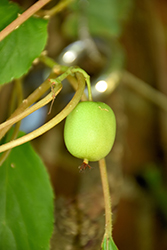Height: 40 feet
Spread: 24 inches
Sunlight:
![]()
![]()
Hardiness Zone: 4
Other Names: Bower Actinidia
Description:
A vigorous climbing vine, great for covering arbors and trellises or screening a chain-link fence; a male selection used for pollinating fruiting varieties, produces flowers but sets no fruit
Ornamental Features
Weiki Hardy Kiwi features dainty fragrant white buttercup flowers with yellow anthers along the branches from mid to late spring. It has dark green deciduous foliage. The large oval leaves turn yellow in fall.
Landscape Attributes
Weiki Hardy Kiwi is a dense multi-stemmed deciduous woody vine with a twining and trailing habit of growth. Its relatively coarse texture can be used to stand it apart from other landscape plants with finer foliage.
This is a relatively low maintenance woody vine, and is best pruned in late winter once the threat of extreme cold has passed. It has no significant negative characteristics.
Weiki Hardy Kiwi is recommended for the following landscape applications;
- Hedges/Screening
- General Garden Use
Planting & Growing
Weiki Hardy Kiwi will grow to be about 40 feet tall at maturity, with a spread of 24 inches. As a climbing vine, it tends to be leggy near the base and should be underplanted with low-growing facer plants. It should be planted near a fence, trellis or other landscape structure where it can be trained to grow upwards on it, or allowed to trail off a retaining wall or slope. It grows at a fast rate, and under ideal conditions can be expected to live for approximately 15 years.
This woody vine does best in full sun to partial shade. It prefers to grow in average to moist conditions, and shouldn't be allowed to dry out. It is not particular as to soil type or pH. It is highly tolerant of urban pollution and will even thrive in inner city environments. This is a selected variety of a species not originally from North America.

